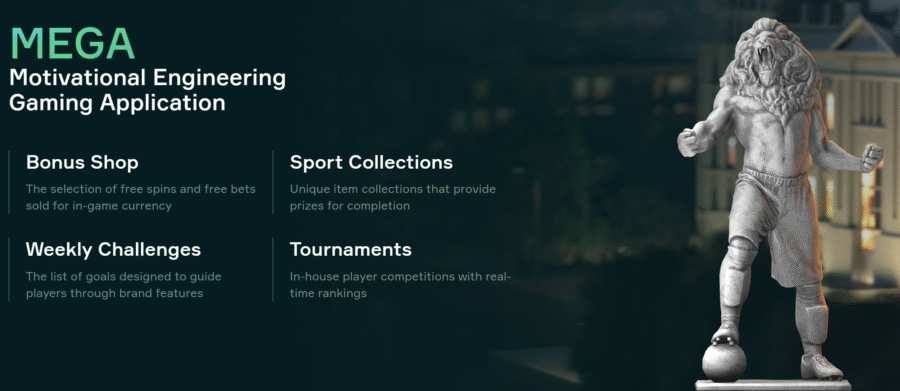Soft2Bet showcasing Motivational Engineering Gaming Application Platform at the Global Gaming Expo

Igaming solutions provider Soft2Bet returns to the Global Gaming Expo in Las Vegas from today through 9 October, where it will showcase its Motivational Engineering Gaming Application at Booth #3630.
Motivational Engineering Gaming Application was awarded Product Innovation of the Year at the 2025 Global Gaming Awards Americas.
The tool uses gamification to create personalized player experiences that enhance engagement, retention, and responsible play, according to Soft2Bet.
Soft2Bet will host several interactive sessions, demonstrating how the Motivational Engineering Gaming Application supports operators in differentiating their brands and strengthening player loyalty.
A headline event is scheduled for 2:30 p.m. 8 October, when the team will deliver a live workshop highlighting the application’s effect on performance and customer experience.
The return to Global Gaming Expo follows a year of growth for Soft2Bet, including momentum in North America through brands such as ToonieBet in Ontario, where Motivational Engineering Gaming Application has driven results.
“The Motivational Engineering Gaming Application platform represents the future of player engagement, combining innovation with proven results to help operators not only compete but lead in today’s fast-evolving markets,” Alex Gitsik, Chief Marketing Officer at Soft2Bet, said in a news release.
Dig Deeper
The Backstory
Why operators are racing online now
Asia’s integrated resorts and Western suppliers are converging on the same playbook: push harder into digital, personalize the experience and brace for uneven regulation. The strategy shift has been most visible in the Philippines, where Bloomberry Resorts accelerated plans for an online platform after a ban on Philippine Offshore Gaming Operators cut into a once-lucrative stream. The company telegraphed the move in spring, telling investors it would “further increase” its mass-market reach with a new electronic product slated for the second quarter of 2025. The plan, outlined during its annual meeting, tied the digital pivot to a broader mix of revenue sources as Bloomberry builds Solaire Resort North and leans into a growing domestic economy, with the regulator projecting igaming could reach as much as PHP480 billion next year. That setup, reported in Bloomberry to launch online gaming platform to earn back lost revenue, framed the stakes: defend market share, diversify channels and monetize local demand.
By early summer, the strategy went live. Bloomberry soft-launched its MegaFUNalo site nationwide with casino-style games and a twist: free movie streaming via a tie-up with Viva. Payments are localized through UnionBank, GCash, GrabPay and BPI, and a full launch is targeted for July. Analysts see the entertainment bundle as an attempt to avoid commoditization in a crowded field, even as rivals like Travellers International and Digiplus push their own offers. Initial marketing looks muscular—one brokerage flagged quarterly promo budgets of PHP2 billion—which could buy awareness but compress early margins under revenue-sharing deals with third-party developers. The rollout, detailed in Bloomberry launches online gaming platform, shows how quickly a brick-and-mortar leader can stand up a national app when policy and competition leave little slack.
Product innovation sets the tone at G2E
Suppliers are matching that urgency with tools aimed at higher engagement and retention. Soft2Bet returned to the Global Gaming Expo in Las Vegas to spotlight its Motivational Engineering Gaming Application, a gamification layer that personalizes incentives and behavior loops across operator brands. The product, fresh off a Product Innovation of the Year win at the Global Gaming Awards Americas, underpins Soft2Bet’s push in North America, including Ontario’s ToonieBet. Live demos at Booth 3630 and a workshop on Oct. 8 were designed to quantify uplifts in performance and customer experience, reinforcing the message that gamified UX can lengthen sessions without compromising responsible play. The company’s roadmap and claims are laid out in Soft2Bet showcasing Motivational Engineering Gaming Application Platform at the Global Gaming Expo.
The logic is straightforward: if content libraries look similar from app to app, differentiation shifts to engagement architecture. For operators navigating higher customer acquisition costs and tighter marketing rules, platforms that can segment players more precisely and calibrate rewards dynamically are positioned as margin tools, not just UX polish. As Bloomberry and others scale digital brands, the vendor ecosystem they choose—gamification, payments, data science—will influence unit economics as much as the underlying games.
In-play becomes the battleground
Alongside gamification, in-play betting is where suppliers see the fastest growth, especially in North America. EveryMatrix’s OddsMatrix unit struck a deal with nVenue to bring micro-betting markets across American football, basketball, baseball, ice hockey and motorsport to its operator clients, while nVenue integrates OddsMatrix’s fast soccer markets into its platform. The collaboration, described in Oddsmatrix partners with US micro-market platform nVenue, extends the menu of real-time wagers and short-cycle outcomes designed to keep bettors engaged between marquee events.
The pitch mirrors the gamification case: more granular markets delivered with speed and pricing accuracy can drive frequency and retention without relying solely on bonuses. For sportsbooks that have struggled to reach profitability on pre-match volume alone, micro markets promise higher turnover per session—if latency, integrity and pricing models hold up. The integration breadth also signals a more modular tech stack, where operators plug in specialized providers quickly to chase format trends.
Regulators redraw the lines
Innovation has met a patchwork of rules, especially when products blur categories. Prediction markets operator Kalshi is testing those boundaries with a lawsuit against the Maryland Lottery and Gaming Control Commission after receiving a cease-and-desist order. Kalshi argues its sports event contracts are peer-to-peer swaps regulated by the Commodity Futures Trading Commission, not state gambling authorities, and recently secured a temporary injunction against Nevada’s regulator as a separate test case. The filing, covered in Prediction markets platform Kalshi files lawsuit in Maryland, tees up a jurisdictional fight that could ripple across event-based markets.
For traditional operators and suppliers, the outcome matters less for direct competition than for precedent. If courts carve out federally regulated gray space for event contracts, new products could enter customer wallets without state licenses or taxes, complicating channel strategies and responsible gaming oversight. Conversely, if states prevail, it would affirm the current regulatory perimeter around sports wagering, reinforcing licensing and tax regimes that incumbents have already absorbed into business models.
Leadership depth becomes a competitive edge
A rapid pivot to digital and in-play requires people who can build and operate cross-disciplinary teams. That makes talent pipelines and visibility programs more than HR talking points. Global Gaming Women, created by the American Gaming Association and now an independent nonprofit, named its latest class of rising leaders in partnership with CDC Gaming. The recognition spans corporate communications, property operations and marketing strategy, underscoring how execution in growth areas depends on functions beyond product and trading.
Among the honorees: IGT’s Michelle Schenk, profiled by CDC Gaming at Michelle Schenk, Graton Resort and Casino President Lana Rivera, The Venetian’s People Operations VP Adriana Kasunic and Wondr Nation’s marketing strategy lead Dyani Marvel. The broader slate, aggregated at CDC Gaming’s 10 Women Rising in Gaming, signals where organizations say they are investing: culture and retention, brand differentiation and operational rigor amid rapid change. As highlighted in Global Gaming Women announces 10 Women Rising in Gaming, the initiative has grown to more than 7,000 members, with mentorship and education programs that feed leadership benches at a time when the industry is retooling for omnichannel competition.
The throughline is execution. Digital units need the latitude and governance to move quickly, but also the internal credibility to influence legacy casino operations. Honoring operators, communicators and HR leaders who have navigated heavy change is part of setting that tone.
The stakes for the next 12 months
The industry’s near-term scoreboard is clear: Bloomberry’s July launch will test whether content bundles can unlock mass-market scale, Soft2Bet’s gamification stack will face operator scrutiny on lift and safety, and in-play specialists like OddsMatrix and nVenue will race to prove micro-betting can deliver sustainable margins. Overhanging all of it is regulatory clarity—whether in Manila’s tax and oversight posture as igaming expands or in U.S. courts as event contracts seek firmer footing.
The common denominator is differentiation. As more platforms chase the same players with similar games, engagement architecture, live-betting depth and leadership execution will determine who converts downloads into durable revenue. The backstory shows why companies are moving now—and why the window to build advantage may be narrower than it looks.








